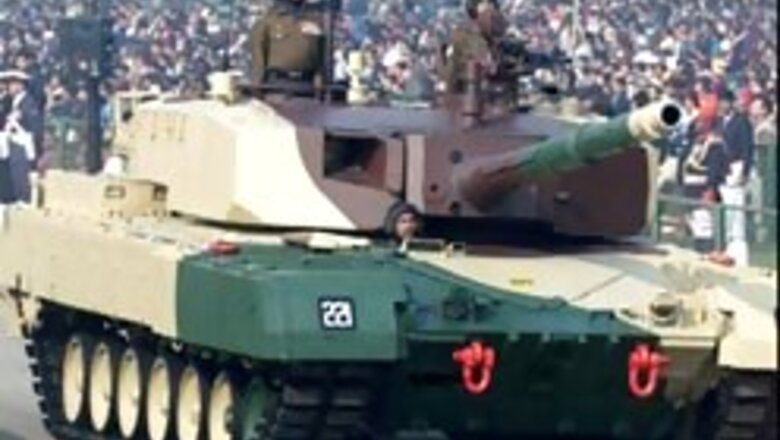
views
New Delhi: As doubts over viability of the three-decade-old Arjun Main Battle Tank (MBT) are being raised, the Army has indicated it would place no more orders than 124 already made to Heavy Vehicles Factory, Avadi, sounding the death knell of the DRDO project.
"Army will no more place orders for Arjun beyond 124 that was already contracted. That is because Army is now looking 20 years ahead and wants a futuristic MBT," Lt Gen Dalip Bharadwaj, Army Director General (Mechanised Infantry), said here.
Though Bharadwaj discounted suggestions that it would mean the end of DRDO's Arjun project that began in 1972, he did point out induction of more 'Arjun' MBTs at this stage would only mean India lagging behind in the technological race in armoured fighting vehicles.
"Arjun is a contemporary tank and may be used in the next decade or so, but not for a technologically advanced, next generation warfare some two decades hence," Bhardwaj said on the sidelines of an interactive session with defence private industry at CII.
After 36 years into its design and development, Arjun had as recently as in December 2007 failed winter trials, as stated in a Parliamentary report. It is yet to go through crucial comparative trials with Russian tanks, a mandatory process before induction into Army.
With uncertainty looming over Arjun tanks, Army has already increased its orders for Russian T-90 tanks by another 330 last year, over and above the 1,000 it had ordered, clearly indicating T-90s would be the MBT of Indian Army for the next decade.
Chennai-based Combat Vehicles Research and Development Establishment (CVRDE) had last year handed over 14 Arjuns to the Army for trials but they were returned with a list of defects in its fire control systems, inaccuracy of guns, low speeds in tactical areas such as deserts and inability to operate in temperatures above 50 degrees Celsius.
This summer too Army and the DRDO took out Arjuns for trials, but the results were yet to be made public. Meanwhile, the Defence Ministry claimed it suspected an effort at "sabotaging" Arjun tanks, though reasons for the suspicion were not spelt out by Minister of State for Defence Production Rao Inderjit Singh.
The DRDO's new project 'Tank-X' too did not find favour with the Army. "Tank-X is a hybrid of T-90 and T-72, which are both contemporary technology tanks. There is no point in having technologically obsolete tanks for warfare two decades hence," the DG (Mechanised Forces) said.
Bharadwaj also announced that the Army, along with CII, would organise a two-day international technology seminar on Future Main Battle Tank (FMBT) and Future Infantry Combat Vehicle (FICV) here on July 22 and 23 to discuss global challenges in designing, developing and producing FMBT and FICV.
PAGE_BREAK
To be inaugurated by Defence Minister A K Antony and Rao Inderjit Singh, Bhardwaj said the seminar would debate the kind of MBT Army needed, considering that might of the
military was judged by both deterrent and offensive capabilities of Mechanised Forces and on the quality and quantity of equipment.
"Time has come to reassess our requirements. We are at the threshold of formulating qualitative requirements of FMBT and FICV. This is the future, as it takes about a decade for completing the process of designing and being ready with a prototype of FMBT and FICV. It could take another 5 to 10 years to finally induct futuristic MBTs and ICVs into the
forces," he said.
The meeting would also provide defence planners, end-users, scientists and both private and public defence manufacturers a holistic view of applicability of tanks, be they heavy, medium or light, and wheeled or tracked in modern warfare.
"Considering India's expanding strategic reach and widening global standing as a military power, future armoured vehicles should be capable of performing roles during out-of-area contingencies beyond its territorial boundaries," Bharadwaj said.
The meet would also try to provide defence industry an insight into Mechanised Forces' aspirations and try to gauge their capability to meet Army's future requirements.
Apart from looking at varying global perceptions on use of armoured vehicles, the seminar would identify critical emerging technologies in the field to meet Army's requirements of FMBT and FICV.
Already, seven foreign countries have confirmed their participation in the seminar including US, Israel, Russia, Germany, UK and France.



















Comments
0 comment